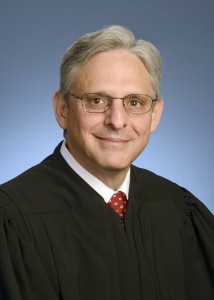On the Hill: With SCOTUS Nominee, Obama Fails to Diversify the Court
 Judge Merrick Garland, President Obama's Supreme Court nominee
Judge Merrick Garland, President Obama's Supreme Court nominee Following the death of US Supreme Court Justice Antonin Scalia in February, I wrote an article outlining how the Obama administration had a unique opportunity to diversify the nation’s highest court. Before Scalia’s death, the court was composed of six Catholics and three Jews, which was an okay representation of the Abrahamic faiths (excluding Protestants and Muslims) but didn’t do much as far as representing the 23 percent of Americans who don’t associate with religion or are atheistic, nor for those who belong to other religions such as Hinduism, Buddhism, and the Baha’i faith.
It’s worth remembering that in the run-up to President Obama’s nomination of a candidate, announced today in a Rose Garden speech, congressional Republicans have all but announced a full boycott of any judicial nomination before the presidential election. Their primary concern has been that the president would appoint a liberal justice who could sway the court to the Democrat’s side for decades to come.
But as I pointed out in my previous article, moderate judicial candidates are plentiful in the federal court system, and President Obama, knowing the difficult political conditions under which his nomination would be made, was likely to choose a judicial moderate in the hope that congressional opposition would fade.
It seems as though the president has done just that, nominating Merrick Garland, chief judge of the United States Court of Appeals for the District of Columbia Circuit. Garland is a widely respected judge, a moderate, and a member of the Jewish faith.
If confirmed, Garland would adjust the religious landscape of the Supreme Court to five Catholics and four Jews. While this would be great news for both the Catholic and Jewish communities, each of which have faced generations of discrimination and stigmatization by a political class that preferred Protestants over any other religious group, it’s a worrying development for the religious diversity of the court. With just 21 percent of all Americans identifying as Catholic and 2 percent identifying as Jews, concerns about the ability of the Supreme Court to understand the struggles of other religious groups and of the nontheistic, both of which represent a sizeable portion of the total population, are growing.
Will the court be able to understand the plight of American Muslims, who face persistent discrimination both by members of the police force and American business owners? Will the court uphold the separation of church and state and equally consider the opinions of atheists, even though every member of the court adheres to some sort of religious tradition? Will the court push back against the rising tide of religious conservatives who wish to see the majority religion, Christianity, inserted into public schools and our political process?
All of this remains to be seen, but by refusing to nominate a judicial moderate from a different religious tradition than Judaism or Catholicism, President Obama has allowed these important questions to resurface. In doing so, he missed a vital opportunity to reassure the American people that the Supreme Court cares equally about all Americans and reflects the diversity that makes this nation so great.
